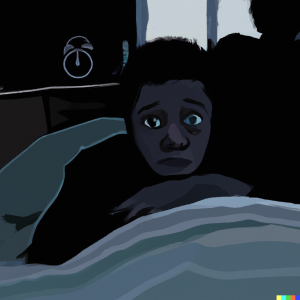Everything you wanted to know about CPAP machines (but were afraid to ask)
- Replies 10
Sleep apnea is a pretty insidious beast. It's been shown to be a risk factor for several serious health conditions, including heart disease, stroke, and diabetes. And yet, for all its notoriety, there's still a lot of mystery surrounding the condition. In my case, I had sleep apnea without noticeable snoring, so it took me a while to figure out why I was always so tired during the day.
If you're reading this, chances are you or someone you know has been diagnosed with obstructive sleep apnea (OSA) – or at the very least you have your suspicions. And chances are, you've been told that the best way to treat OSA is with a CPAP machine. But what is a CPAP machine, anyway?
In this article, we'll tell you everything you need to know about CPAP machines, from how they work to what to expect when you start using one.
But first things first... What's sleep apnea?
Sleep apnea is a condition in which breathing is interrupted during sleep. This can happen because the airway is blocked (obstructive sleep apnea, or OSA) or because the brain doesn't send the right signals to the muscles involved in breathing (central sleep apnea). OSA is much more common, and it's what we'll be focusing on in this article.
OSA is caused by a collapse of the airway. This can happen because the muscles that keep the airway open relax too much, or because there is extra tissue in the airway (like the soft palate or uvula). When the airway collapses, it causes a partial or complete blockage of airflow. This can lead to snoring, gasping, or choking sounds, and it can also cause interrupted breathing during sleep.
Sleep apnea can be a serious condition because it can lead to several health problems, including high blood pressure, heart disease, stroke, and diabetes. It can also cause daytime fatigue, irritability, and trouble concentrating.
So how does a CPAP machine help?
A CPAP machine is the most common treatment for OSA. CPAP stands for continuous positive airway pressure, and that's exactly what the machine does - it provides a steady stream of air pressure to keep the airway from collapsing.
The machine has three main parts: the mask, the tubing, and the machine itself. The mask is worn over the nose and/or mouth, and it's connected to the tubing, which is in turn connected to the machine. The machine pumps air through the tubing and into the mask, which keeps the airway open.
There are a few different types of masks, and you'll need to work with your doctor or sleep specialist to find the right one for you. The most common type is the nasal mask, which covers the nose only. There are also full-face masks, which cover the nose and mouth, and nasal pillows, which are small, soft cushions that sit at the base of the nostrils.
Using a CPAP machine may take some getting used to, but it's generally very effective at treating OSA. In most cases, it's the best option for keeping the airway open and preventing health problems associated with sleep apnea.
What can I expect when I start using a CPAP machine?
When you start using a CPAP machine, you may experience some side effects, like a dry or stuffy nose, a sore throat, or headaches. These side effects are usually mild and go away after a few days or weeks of use.
If you have trouble adjusting to the CPAP machine, there are a few things you can do to make it easier. Make sure the mask fits well - a good fit will help reduce leaks, which can cause dryness and irritation. You can also use a humidifier with your CPAP machine to add moisture to the air. This can help relieve congestion and dryness.
Sounds like a hassle. Is a CPAP really worth bothering with?
Absolutely! If you have sleep apnea, CPAP therapy is the gold standard treatment. It's effective, and it can improve your quality of life in many ways. After all, good quality sleep is crucial to good health.
If you're still on the fence about whether or not to start CPAP therapy, talk to your GP or ask for a referral to a sleep specialist. They can help you weigh the pros and cons and decide if CPAP is right for you. Medicare may even cover the cost of a sleep study!
If you're reading this, chances are you or someone you know has been diagnosed with obstructive sleep apnea (OSA) – or at the very least you have your suspicions. And chances are, you've been told that the best way to treat OSA is with a CPAP machine. But what is a CPAP machine, anyway?
In this article, we'll tell you everything you need to know about CPAP machines, from how they work to what to expect when you start using one.
But first things first... What's sleep apnea?
Sleep apnea is a condition in which breathing is interrupted during sleep. This can happen because the airway is blocked (obstructive sleep apnea, or OSA) or because the brain doesn't send the right signals to the muscles involved in breathing (central sleep apnea). OSA is much more common, and it's what we'll be focusing on in this article.
OSA is caused by a collapse of the airway. This can happen because the muscles that keep the airway open relax too much, or because there is extra tissue in the airway (like the soft palate or uvula). When the airway collapses, it causes a partial or complete blockage of airflow. This can lead to snoring, gasping, or choking sounds, and it can also cause interrupted breathing during sleep.
Sleep apnea can be a serious condition because it can lead to several health problems, including high blood pressure, heart disease, stroke, and diabetes. It can also cause daytime fatigue, irritability, and trouble concentrating.
So how does a CPAP machine help?
A CPAP machine is the most common treatment for OSA. CPAP stands for continuous positive airway pressure, and that's exactly what the machine does - it provides a steady stream of air pressure to keep the airway from collapsing.
The machine has three main parts: the mask, the tubing, and the machine itself. The mask is worn over the nose and/or mouth, and it's connected to the tubing, which is in turn connected to the machine. The machine pumps air through the tubing and into the mask, which keeps the airway open.
There are a few different types of masks, and you'll need to work with your doctor or sleep specialist to find the right one for you. The most common type is the nasal mask, which covers the nose only. There are also full-face masks, which cover the nose and mouth, and nasal pillows, which are small, soft cushions that sit at the base of the nostrils.
Using a CPAP machine may take some getting used to, but it's generally very effective at treating OSA. In most cases, it's the best option for keeping the airway open and preventing health problems associated with sleep apnea.
What can I expect when I start using a CPAP machine?
When you start using a CPAP machine, you may experience some side effects, like a dry or stuffy nose, a sore throat, or headaches. These side effects are usually mild and go away after a few days or weeks of use.
If you have trouble adjusting to the CPAP machine, there are a few things you can do to make it easier. Make sure the mask fits well - a good fit will help reduce leaks, which can cause dryness and irritation. You can also use a humidifier with your CPAP machine to add moisture to the air. This can help relieve congestion and dryness.
Sounds like a hassle. Is a CPAP really worth bothering with?
Absolutely! If you have sleep apnea, CPAP therapy is the gold standard treatment. It's effective, and it can improve your quality of life in many ways. After all, good quality sleep is crucial to good health.
If you're still on the fence about whether or not to start CPAP therapy, talk to your GP or ask for a referral to a sleep specialist. They can help you weigh the pros and cons and decide if CPAP is right for you. Medicare may even cover the cost of a sleep study!








